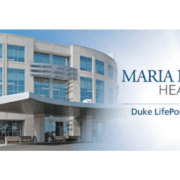TownTalk 02-22-21 Dr. Jennifer Rymer (Covid and Your Heart)
People with existing or underlying heart conditions could experience worse symptoms if they are diagnosed with COVID-19, and a local cardiologist wants to get the word out to the community to seek medical treatment if symptoms persist.
Dr. Jennifer Rymer, an interventional cardiologist at Maria Parham Health, often sees patients who are having heart attacks when they come to the hospital. Treating heart conditions amidst a global pandemic adds a layer of caution to the work she performs.
“COVID can take all of the heart conditions – pain, fluid retention and shortness of breath with congestive heart failure and just make it worse,” she said on Monday’s Town Talk with John C. Rose. “It can weaken the squeeze of the heart and it can cause clots to form in both heart arteries and lung arteries,” she said.
“The best way to avoid all this is to avoid the virus,” Rymer said, whether by social distancing, wearing a mask or getting the vaccine. “As soon as you can get the vaccine…you should absolutely attempt to get it,” she said.
Side effects of the vaccine, for the vast majority of those who have received the shot, are minimal and short-lived. They include mild flu-like symptoms like low-grade fever and achiness. These usually go away within 48 hours of getting the vaccine. If those symptoms do NOT go away after, say 72 hours, you should get checked out by a medical professional.
The protective properties of the vaccine are especially important, especially those with heart conditions. “The protective mechanism of the vaccine … cannot be underscored enough,” Rymer said. “It is just critical for these patients to try to get immunity to this disease and to this virus.”
That post-vaccine achiness is actually “your body’s attempt at working to develop antibodies against the virus.” Rymer said. Although not particularly pleasant to endure, she said it is “a sign that the immunization is working.”
Dr. Jennifer Rymer audio on WIZS TownTalk. Story script continues below.
Interventional cardiologists perform catheterizations, and often are able to fix blockages with either the placement of stents or balloons to strengthen a weakened blood vessel wall. Patients with underlying heart disease, who have already had a heart attack or who have congestive heart disease aren’t able to rebound as quickly from other health problems, she said. COVID-19 “puts the body under stress,” she said, and those with coronary disease are more susceptible.
People also can experience a heart attack as a result of their COVID-19 infection, she said, because of the added stress the virus infection places on the body. Additional health problems such as diabetes, high cholesterol and being overweight add more risk factors for patients, she said. Patients in these higher-risk categories often aren’t able to fight off infection as well, Rymer added.
Complications of COVID-19 can include the formation of clots in the arteries of the lungs and heart, she said. Symptoms include chest pain that is new for you, and extreme shortness of breath. Increased fluid retention is another symptom to be mindful of, she noted. These symptoms also are associated with congestive heart failure, she said. “COVID can take all the symptoms and make it worse,” she warned.
Rymer said even patients in their 20s and 30s with no underlying heart conditions have experienced heart problems brought on by COVID-19. The virus can attack the heart wall which can mimic congestive heart failure. In such cases, the patients are treated with medications to try to improve the function of the heart wall muscle – “hopefully the symptoms will resolve, but in some cases it doesn’t resolve,” she said.
(Maria Parham Health is a paying advertising client of WIZS Radio and WIZS.com. This is not a paid advertisement.)
(This post, news and audio is not meant to offer medical advice or to render a diagnosis or treatment options. Always consult with your physician or a medical professional. This is an informational broadcast and script only.)

